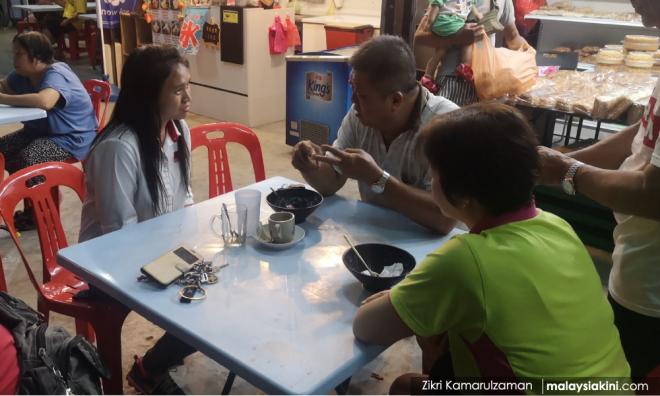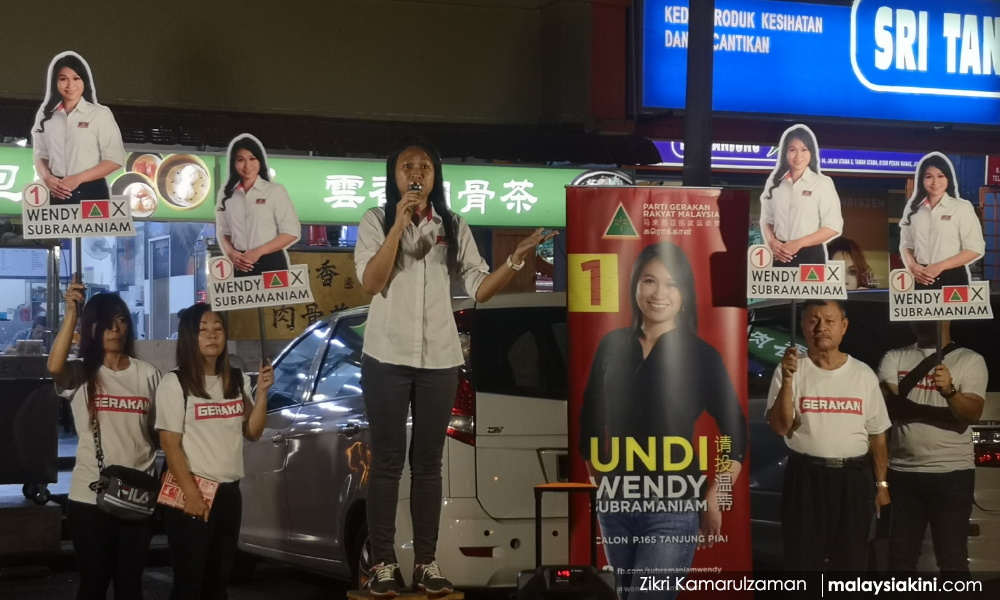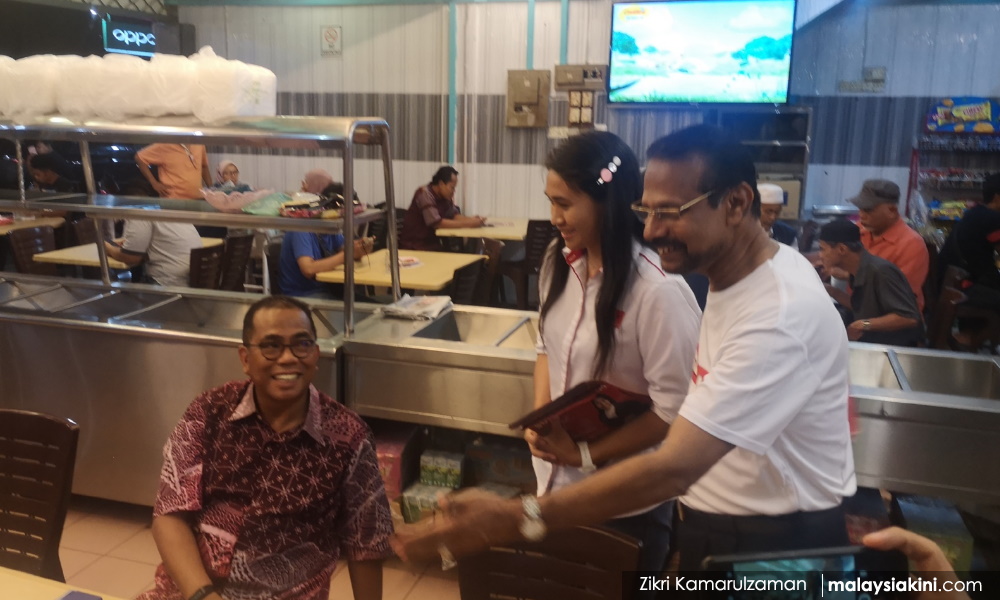
TG PIAI POLLS | When Gerakan announced it was contesting in the Tanjung Piai by-election, many scoffed at the idea.
The party had been completely wiped out in the 14th general election and has since mostly fallen out of mainstream consciousness.
Its decision to unveil candidate Wendy Subramaniam in Kuala Lumpur also raised questions whether Gerakan had enough support in Johor to be considered a serious contender against Pakatan Harapan or BN, the coalition that dropped out of after GE14.
So when the party held first ceramah session in Tanjung Piai on Monday, Nov 4, what Malaysiakini observed did not inspire further confidence.
Held indoors at a shoplot turned Gerakan operations centre in Pekan Nanas town, the talk, which featured party president Dominic Lau, was attended by only about 20 Gerakan members.
It was a tepid end to a rough day that saw three Gerakan branch leaders announce that they were quitting the party to support BN's Wee Jeck Seng. Lau claimed this was an act of sabotage by another party.
Things were not expected to improve the next night when they held a public ceramah opposite a kopitiam (traditional coffee shop) in the same part of town.
When it started at 8pm, the only people listening to the talks in Manadarin were onlookers from the kopitiam
But as the night wore on, the situation slowly started to change.
One by one, middle-aged Chinese motorcyclists would park their kapchai across the road and start listening intently to the speakers. Others began to take seats in the kopitiam that gave them a clear view of what was going on.
When Wendy arrived, several of those in the kopitiam enthusiastically shook her hands when she came up to them.
At its peak, besides a handful of party workers, some 50 people were watching the Gerakan ceramah.
This doesn't sound like an impressive number, but it was comparable to a Harapan talk at the same location the night before, which featured Defence Minister Mohamad Sabu and his deputy Liew Chin Tong, who is also the Johor DAP chief.
Some 80 people were estimated to be present at the Harapan ceramah on the night of Nov 4, with 50 of them being Harapan campaigners.
Resting on his bike, 50-year-old Tan Ah Kiong somberly said that after voting for a change of government, he now wanted to vote for someone else.
"(This government) talks too much about race, but it is going back to the old ways," he said.
He said this time around he wanted to vote for someone who could speak freely, without having to toe the party line.
"I don't want someone who is on a leash. Wee Jeck Seng really is good. But he is like a dog that is on a leash. If he won, it would be the same. Those who are leashed are of no use," Tan said.
Monitoring the ceramah from a kopitiam, 65-year-old Lim also expressed similar sentiments.
"When (Prime Minister) Dr Mahathir Mohamad went to the Malay Dignity Congress, the Chinese felt a bit sad. If Malays did it, and Chinese and Indians want to do it too. It would not be good," he said.
The trader, who voted for Harapan in the last election, also claimed that Harapan had failed to deliver on its election promises.
Disgruntled Chinese support is a fact acknowledged by Harapan parties, which are appealing to voters to give the one-and-a-half-year government more time to turn the country around.
DAP's Pekan Nanas assemblyperson Yeo Tung Seong told Malaysiakini that there are expectations that any loss of votes from Harapan's Chinese base would go to Gerakan instead of MCA, due to the latter's ties with Umno and PAS.
But Tanjung Piai can't be won with Chinese votes alone. While 42 percent of the voters are Chinese, another 57 percent are Malays.
While most of its campaign appears to be geared towards the Chinese, Gerakan had, last Wednesday, held a ceramah programme in front of an eatery that is frequented by Malays in Pekan Nanas.
There, things were not as smooth for the party.
Wendy started off her Malay speech by commenting on confusion regarding her ethnicity
"People ask why do I have an Indian name, talk like a Chinese, but look like a Malay? It is because I am Malaysian," she said.
In a different ceramah setting with an invested crowd, such a remark would have drawn loud applause.
But, unfortunately for Wendy, her message fell on deaf ears.
It was also clear that Wendy was not as confident speaking Malay as she was with Mandarin, and those who were at the Malay ceramah were not won over by Gerakan's multicultural third-force narrative.
"I don't think she can get the Malay vote. But she is putting in an effort, so that is good," said 73-year-old Abdul Rahman Ghaffar.
For Osman Wan Abdullah, Malays votes will either go to the BN or Harapan, with some stray ballots going to Berjasa.
BN and Harapan are both expected to retain their share of the Malay votes from the general election, which was at 57 percent and 32 percent respectively.
Meanwhile, the nine percent that voted for PAS are expected to be split between BN and Berjasa.
With a voter-base likely to consist mainly of Chinese votes, it is unlikely for Gerakan to stage an upset and win the Tanjung Piai seat.
However, if it manages to keep its deposit, the party can use it as a launchpad back into mainstream politics.
When met at a Gerakan ceramah on Sunday, a 71-year-old retiree, who only wanted to be known as Aw, said the Tanjung Piai by-election would be good practice for the party.
"Whenever you contest, you need to practice. You need to practice for everything... Even if you fail the first time, don't be afraid. There is still a second chance," Aw said.
Besides ceramah sessions, Gerakan has also been actively holding walkabouts and meet-and-greet sessions with voters.
One key area it is focusing on are issues involving oil palm stakeholders. Gerakan president Lau has roped in his predecessor, Mah Siew Keong, who was a former primary industries minister, to act as an advisor to Wendy on such issues.
Of the major parties that are contesting, Gerakan is also the only one that has launched a manifesto, aimed at boosting Tanjung Piai's economy by creating jobs by bringing in agricultural technology, among others. The manifesto also touches on the social wellbeing of the people and their cost of living.
Lau said if the government will not help Gerakan achieve its vision for Tanjung Piai, the party will find ways to self-finance its initiatives. - Mkini







No comments:
Post a Comment
Note: Only a member of this blog may post a comment.